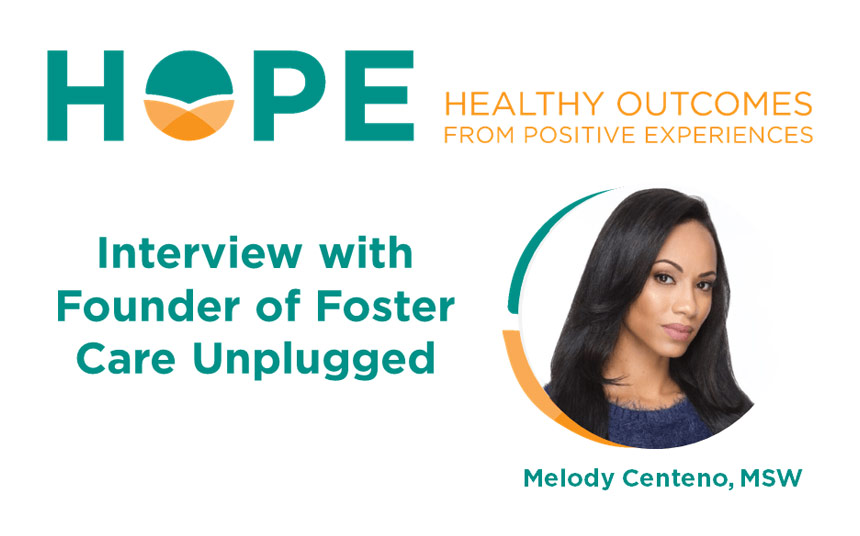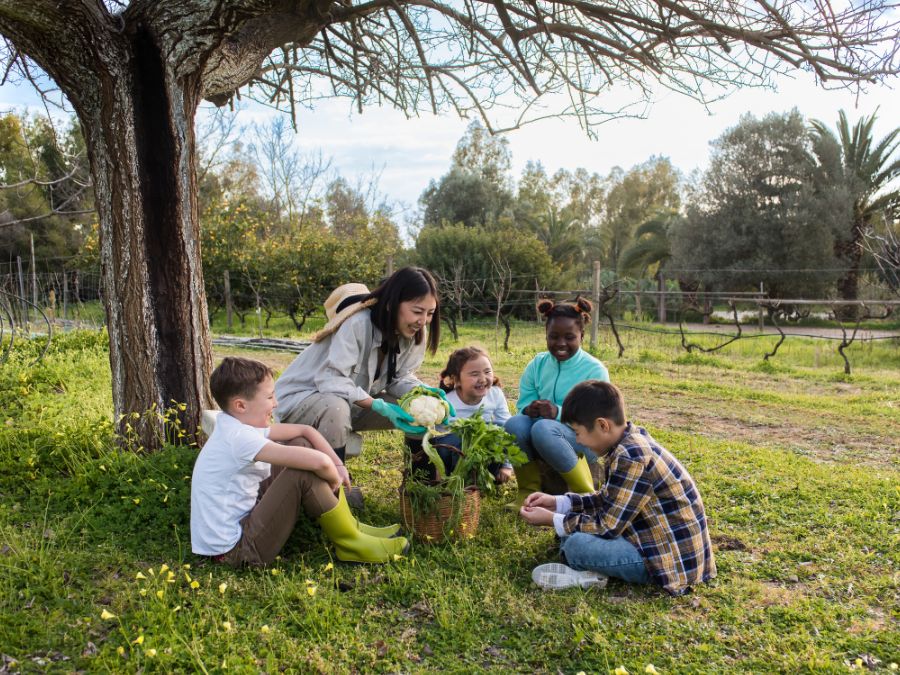
We met Melody Centeno when she spoke at the National Conference on Child Abuse and Neglect this spring. She embodies so much of what HOPE stands for: the healing told of sustained nurturing relationships, and how safe stable and equitable environments promote child development. From her experience, we see how history is not destiny. She is now a licensed social worker in New York, and has used her own experiences to improve the lives of others. Melody inspires so many when she talks about the issues facing children and youth in foster care. We are honored and delighted that she has taken the time to speak with us.
Please introduce yourself and your work to our readers.
I am the founder of Foster Care Unplugged, and I am what you call a lived experience expert as a former foster child who navigated through the child welfare system.
Can you talk about Foster Care Unplugged and the work that you do?
Foster Care Unplugged was founded in 2016, originally just as a social awareness campaign. Then, it grew arms and legs. So we turned it into a not-for-profit, aiming to really support foster care youth on their journey to resiliency as they navigate through the child welfare system. We are secondary supports to most of the contracted agencies in the city who have responsibility over them and secondary supports to the administration for children services.
How can promoting positive childhood experiences help children in foster care?
When I did the conference recently at the Children’s Bureau, I shared the story of how my sister and I met my foster mother, who really took her time to show us the importance of love and hope. Aunty Pat, we call her; she took us home and said “it is time for you to take a shower.”
In the previous home, we had a foster mother who really traumatized us. I remember her saying “My water bill is going up, so for now on you guys will not take a shower individually. Girls will shower together and boys will take a shower together. And there is too much laundry and that is also making my water bill go up. So instead… you all are going to dry yourself with this one washcloth after you get out of the shower.” And I remember lining up, my siblings and I, and all five of us having to share this one wash cloth.
So when we got to this new foster home, my sister and I went into the bathroom together thinking it would be the same routine. Aunty Pat stopped us and said “What are you guys doing?” and we said “Oh we are about to take a shower, but we don’t want to waste your water and get kicked out.” She said “What? No, that is not how that works.” She taught us the importance of privacy and self-esteem. She said “You guys are going to take a shower separately.” I was shocked that she even said that, and then she asked “Do you even know how to bathe properly?” I immediately put my head down; no one really taught me the importance of hygiene. … [So] she said, “I am going to teach you how to bathe properly.”
And when she started to scrub my arm I saw that she started to cry, and said, “You are three shades lighter.” And it was in that moment that she realized that we had really been through a lot. It was like a symbolism behind that, and it made her sob. She looked at me and said “I am going to love you until you become an adult, this is the last foster home that you go too.” And that was the start of the installation of hope. Just that one simple conversation made me feel like, wow I am now in a safe haven.
How does Foster Care Unplugged (FCUP) help promote the Four Building Blocks of HOPE for youth and foster families?
FCUP has all four [building] blocks built into our programming and our model; so, I am glad there are people all over the country doing the same work. All of our programing essentially has a therapeutic component attached to it. As a licensed social worker, I think it is imperative that we get our youth constantly engaged in the clinical work. But as a lived experienced expert, I also understand the challenges of not wanting to go to therapy and how difficult it is to have one-on-one therapy with a therapist. So, I merged cultural arts with therapeutic approaches.
For example, we have a short film project and a play that we do annually with our healing homes, often called group homes, to help the youth engage with one another and learn adaptive and effective communication skills as well as conflict resolution. They have to go through a series of therapeutic group practice with me. Then, we transition it over into writing a film together, carving out characters, using our storylines to build the characters. Next, we shoot and film them, and they have an amazing time on set. It is a really empowering approach to getting them to engage in therapy and to have adaptive and healthy social skills amongst one another. We dismantle a lot of apprehensions that they have with engaging in [therapeutic] services; a lot of our youth end up going into treatment after because they realize therapy is not so bad, and want to continue! And when we see that happen we ultimately know we have completed our goal.
How do FCUP’s programs focus on individual strength through adversity?
In our other program we do psycho-drama using the lens of human trafficking prevention. We have a contract with the city as well as New York City Trust who funds us. We specifically work with youth who have been human trafficked or are at risk. And foster care youth are, unfortunately, a very vulnerable population; so, they are at risk of being human trafficked or have experienced things such as grooming [building a relationship of trust to then sexually exploit youth] while they are in the child welfare system. We infuse education with drama so once they know how the educational component matches up with their lived experience, and they have to hit the stage every week to carry out a role play or any of our psycho-drama approaches.
In that moment, they are given skills they can actually implement based on the experiences they have already been through and to avoid being placed in those situations again. In the role play, they have that pivotal moment where they are like “Wow, this is a strength that I actually have. I do possess resiliency skills, and I do understand the power of no because it happened when this happened.” And so now you are convicted on a deeper level, which means if ever placed in that situation again you will know what to do based on the strengths that we have highlighted through role play.
How does cultural competency factor into your work at FCUP?
We have a “bros for bros” suit project where we pair a successful male figure in the community with one of our young male adults or youth. And the first time we did this, I remember there were these eight successful men and eight youth that we paired them with, and we had to meet them at the office where we were giving the youth custom-made suits. I remember the men were talking to the youth and saying “So do you know what a 401k is?” or “Do you know what benefits are?”
And I had to pull the gentlemen to the side and say that I noticed two youth starting to put their heads down as if they were tired. But they weren’t; they just could not keep up with the dialogue level of the successful men. This is what we are talking about when we talk about culture. We are transient youth who are moving from place-to-place, our reading and writing levels are sometimes not up to par, and our goals and aspirations may not be comparable to a lot of successful people. So you need to meet people where they are, and you have to let them be empowered to then learn the experiences that you have and not just presume that they should know these things.
Is there anything we haven’t asked about that you would like the readers to know?
There is a lot of stigma that comes with foster care youth. Our language is very important when you are connecting with us. I will give myself for example, a lot of times when I go and speak or I interact with people there are just things that are said that I am just like “huh?” For example” You don’t look like a foster child.” Well what are we supposed to look like? “But you don’t sound like one, you are actually very educated.” Ok, are we not educated?
So, just know that language is very important when you connect to us, and that you have to question the stigmas that maybe we have bought into as it is related to foster care youth. We do not always have behavioral issues like you see on television. Sometimes, we are just guarded because we are in survival mode, and if you take an extra opportunity to really establish a rapport with us, a lot of those guards go down very quickly because we want to have those relationships. And we want to connect, but we want to be safe while doing so.


